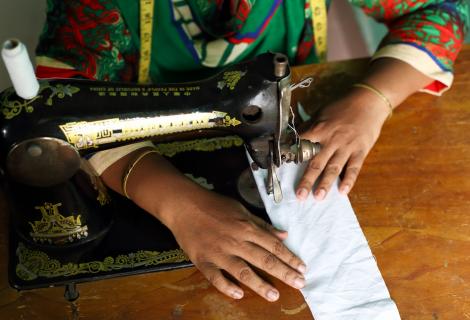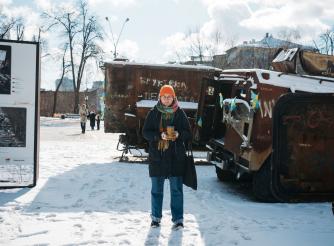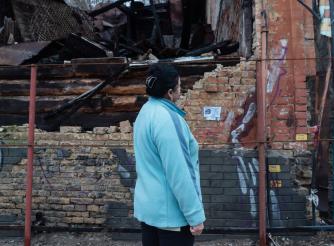"Garment workers don’t care about catching Covid-19, their main worry is that they will starve"

Phyo leads ActionAid Myanmar’s work supporting garment workers affected by the coronavirus crisis. Here she explains why the pandemic is leaving informal workers without any means to support their families and putting women at greater risk of violence.
Coronavirus is taking a devastating toll on Myanmar’s informal workforce, particularly women garment workers. Before we had our first case confirmed, factories had already begun to slow down due to the spread of Covid-19 in China. When the pandemic hit Europe, we saw a new wave of cancellations from brands.
The ongoing impact of coronavirus on global supply chains has left many people without jobs. Government figures show that more than 60,000 factory workers have lost their jobs since the start of the crisis, including those working in the garment factories that supply some of the world’s biggest fashion brands, where the vast majority of these workers are women.
Workers have told me that they are not worried about catching the virus; their main worry is that they will starve. But their fears are going unheard by businesses and governments.
The Myanmar government has unveiled an economic relief package, which is a good start, but we are worried that the protections for some workers are very minimal. Far more support is needed for informal workers and marginalised groups, such as women garment workers.
In factories you have a lot of daily workers and a lot of part time workers, who are not entitled to any government support. These workers are struggling for basic survival. Each day without work means another day without food. People have lost their only means of livelihood, for themselves and the families that they support.
Myanmar is a big producer and exporter of food. Something that was really hard for me to hear was at the start of the crisis there was a surplus of food that couldn’t reach China, we had piles of rotting food waiting, which couldn’t be sent due to travel restrictions. But now we have people starving, it is heartbreaking and so very unfair.
As well as losing their livelihoods and facing rising hunger, women are also at greater risk of violence. ActionAid works with paralegals to support women experiencing domestic and sexual violence. While we have seen an increase in new callers to our helpline as coronavirus restrictions have been brought in and factories have shut, we are concerned how many more women are at risk, but afraid to speak out.
It is becoming much harder for women to access services for survivors of gender-based violence due to the lockdown. ActionAid is making sure our helpline is open and moved our support services online.
We are trying to ease the financial burden on some of the most vulnerable workers, including single women and pregnant women, by providing food relief and cash transfers. As well as this we are working to support female factory workers who have experienced gender-based violence through our network of paralegals.
For those whose factories are still open, they face unsafe conditions and a lack of protection. I spoke to one woman who was working in a garment factory. She told me that there are no facemasks available and there is no access to clean water, meaning no one can wash their hands. She told me people are worried about getting infected, but everyone says their livelihoods are more important than getting the virus. If these workers do not work, they simply can’t live.
Access to water has long been a problem for some communities here. In Myanmar we rely on collecting rainwater and Covid-19 has struck in our hot season. We are distributing hand sanitizers to the workers when there is limited water and raising awareness about social distancing, and ways to protect themselves.
ActionAid Myanmar is supporting 150,000 garment workers in five industrial areas of Yangon, Bago and Ayeyarwaddy by providing public health information in local languages on how to prevent the spread of coronavirus, follow self-isolation and handwashing guidance.
Migrant workers are facing many difficulties and challenges. They have been arrested for protesting over job losses and speaking out against their unfair treatment. They face discrimination in the communities where they live. After a case of COVID-19 was found in one factory, thousands of workers were left ostracised and some were unable to return to their homes. We have had people arrive at our office with their belongings looking for somewhere to stay. This is the reality of coronavirus for many people.
You can support ActionAid’s coronavirus appeal here: https://www.actionaid.org.uk/donate/emergency/coronavirus-appeal
Ends


